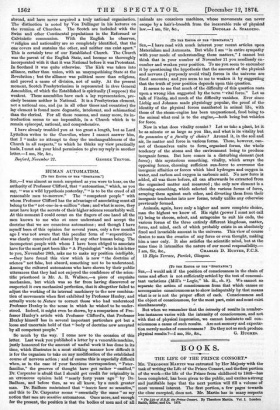HUMAN AUTOMATISM.
[To THE EDITOR OF THZ "SPECTATOR."]
was almost as much surprised as you were to hear, on the authority of Professor Clifford, that "automatism," which, as you say, "was a wild hypothesis yesterday," "is to be the creed of all reasonable men to-morrow." The "competent people" with whom Professor Clifford has the advantage of associating must all belong to the" not-one-in-a-million " clam; and what is more, they must have kept the secrets of their higher science remarkably well. At this moment I could count on the fingers of one hand all the men known to me who at once understand and accept the doctrine that we are conscious automatons ; and though I have myself been of this opinion for several years, only a few months ago I was not aware that this peculiar form of "superstition" was clearly conceived and shared by any other human being. The incompetent people with whom I have been obliged to associate have for the most part been like " A Physiologist "who in his letter to you, November 28th, asks me to make my position intelligible, —they have found this view which is now "the doctrine of science" not false, but absurd, something not to be understood. Among the cultured automatons who have shown by their public utterances that they had not enjoyed the confidence of the scien- tific priesthood is Mr. A. R. Wallace,—a piece of exquisite mechanism, but which was so far from having discovered or suspected it own mechanical perfection, that it altogether failed to adjust the working of its internal machinery to the new combina- tion of movements when first exhibited by Professor Huxley, and actually wrote to Nature to correct those who had understood Professor Huxley in the sense in which he wished to be under- stood. Indeed, it might even be shown, by a comparison of Pro- fessor Huxley's article with Professor Clifford's, that Professor Huxley himself has in several important particulars got but a loose and uncertain hold of that "body of doctrine now accepted by all competent people."
So much by the way. I come now to the occasion of this letter. Last week you published a letter by a venerable machine, justly honoured for the amount of useful work it has done in its time, which illustrates in a most striking manner how difficult it is for the organism to take on any modification of the established course of nervous action ; and of course this is especially difficult when, as in the case of your facetious correspondent, "Pater- familias," the grooves of thought have got rather "ossified." Dr. Carpenter is afraid that I should get credit for originality in an erroneous opinion held "nearly forty years ago" by Dr. Badham, and before then, as we all know, by a much greater man. Dr. Badhani maintained that "insects have no sensation," and this to Dr. Carpenter seems "essentially the same" as my notion that men are sensitive automatons. Once more, and enough for the present, the position is that the bodies of men and of all
animals are conscious machines, whose movements can never escape by a hair's-breadth from the inexorable rule of physical






































 Previous page
Previous page